BBG Watch EXCLUSIVE
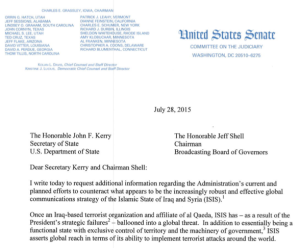 In a letter to Secretary of State John Kerry and Broadcasting Board of Governors (BBG) Chairman Jeff Shell obtained by BBG Watch from congressional sources, Senator Ted Cruz (R-TX) requested additional information regarding “the Administration’s current and planned efforts to counteract what appears to be the increasingly robust and effective global communications strategy of the Islamic State of Iraq and Syria (ISIS).” Senator Cruz charges in his letter that ISIS–once an Iraq-based terrorist organization and affiliate of al-Quaeda–has ballooned into a global threat “as a result of the President’s strategic failures.”
In a letter to Secretary of State John Kerry and Broadcasting Board of Governors (BBG) Chairman Jeff Shell obtained by BBG Watch from congressional sources, Senator Ted Cruz (R-TX) requested additional information regarding “the Administration’s current and planned efforts to counteract what appears to be the increasingly robust and effective global communications strategy of the Islamic State of Iraq and Syria (ISIS).” Senator Cruz charges in his letter that ISIS–once an Iraq-based terrorist organization and affiliate of al-Quaeda–has ballooned into a global threat “as a result of the President’s strategic failures.”
In a separate development before Senator Cruz’s letter, dated July 28, was sent, several Voice of America (VOA) English newsroom staffers strongly questioned whether U.S. taxpayer-funded VOA should engage in countering violent extremism, suggesting that “countering” extremism by VOA would be contrary to good journalistic practice and the VOA Charter.
SENATOR CRUZ: Senator Cruz expressed concern in his letter that “the Administration has an inadequate communications or media-counter strategy for challenging ISIS’s efforts globally.” The letter stated that the failure to counteract ISIS when it uses “the Internet and every-day low-cost communications technology to recruit adherents on a global scale … could have catastrophic results at home and abroad.”
Senator Cruz is the first Hispanic or Cuban American to serve as a U.S. Senator from Texas. In March 2015 Cruz announced he would run for the Republican Party nomination in the 2016 U.S. Presidential election.
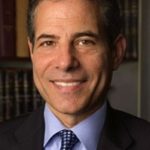
In an interview with CNN’s Erin Burnett last February, U.S. Under Secretary of State for Public Diplomacy and Public Affairs Richard Stengel, who is the Obama Administration official responsible for coordinating countering ISIS communications on social media, said that “We are trying to untie our hands” in dealing with ISIS propaganda. Stengel was responding to CNN anchor’s observation that while ISIS puts out 90,000 social media messages per day, the three State Department digital Arabic teams have put out 60,000 social media messages in five years. We could not independently verify these numbers. Erin Burnett asked him whether he is fighting this battle with “his hands tied behind his back.”
UNDER SECRETARY STENGEL: “And yes, we estimate that they do about 90,000 pieces of social media [per day]. And part of what I’m doing in the digital outreach team that we have is aggregating the content that we do as a government, across government, aggregating the content of our partners, trying to amplify messaging of third party groups to combat that disjunction between what they’re doing and what we’re doing. But I would also point out, Erin, that there are about three million retweets of Justin Bieber everyday. So that’s the other end of the scale.”
Under Secretary Stengel represents Secretary Kerry at BBG board meetings, but in his interview with CNN he did not mention the BBG by name. Secretary Kerry is an ex officio member of the BBG board.
Senator Ted Cruz pointed out in his letter that “Recent stories in the public domain seem to show that the Department of State’s anti-ISIS communications are inadequate, almost to the point of being embarrassing, and may even be having the opposite of the intended effect.” Senator Cruz was referring to Rita Katz’s Time magazine September 16, 2014 article “The State Department’s Twitter War With ISIS Is Embarrassing.”
“These and other accounts do not create any confidence that the Administration either understands the scope of the ISIS threat or is willing to dedicate resources needed to counter its message,” Senator Cruz wrote. But even before he sent his letter, some VOA English newsroom reporters were rebelling against the idea of “countering violent extremism.”
These VOA staffers described VOA coverage of violent extremism as being in many cases “excellent,” but even the State Department has much better social media audience engagement statistics than many of the news reports written by the VOA English newsroom staffers and correspondents. State Department’s Facebook posts usually get hundreds more “Likes” and more comments from Facebook users than VOA English news posts.
The Voice of America in English has become also largely irrelevant on social media when compared to BBC, Russia’s RT or even a major U.S. newspaper such as The New York Times. A single RT online news report can have thousands of Facebook “Likes” and hundreds of comments from readers, while most Voice of America news reports have usually no more than a few “Likes” and hardly any comments on the VOA main English news website. A few comments that are posted under reports on the VOA site often appear to come from pro-Kremlin trolls.
The most vocal critics of the idea of countering violent extremism in Voice of America programs and critics of the H.R. 2323 bipartisan bill to reform the BBG have been some VOA foreign correspondents who hold special U.S. Foreign Service appointments and are paid up to to $150,000 per year and more in addition to numerous other benefits, including free housing abroad. Some of these VOA English reporters have fewer than a 100 Twitter followers and their VOA news reports often show less then 10 Facebook “Likes” and barely any comments. H.R. 2323, the United States International Communications Reform Act, was introduced on May 14, 2015 by Rep. Ed Royce (R-CA) and Rep. Eliot Engel (D-NY) and approved unanimously by the House Foreign Affairs Committee. The bill now awaits further action in the House of Representatives and the U.S. Senate.
Senator Cruz asked Secretary Kerry and Chairman Shell to provide him with “A detailed review of the Department of State’s and Broadcasting Board of Governors’ (BBG) joint and/or separate counter-ISIS communications strategy, including detailed assessments of the effectiveness of each strategic program (with supporting evidence where possible).”
Such supporting evidence of effectiveness may not exist when it comes to VOA English news and programs with their dismally low social media audience engagement metrics. VOA’s foreign language services, with a few exceptions, are not doing much better on social media. According to BBG Watch sources, not being able to provide any meaningful evidence of effectiveness, which would include difficult to misinterpret Facebook, Twitter and YouTube statistics, BBG/IBB officials are trying to count how many people have decided “not to join jihad” as a consequence of their work.
While VOA language services are generally supportive of actually countering violent extremism, some VOA English newsroom reporters are not. Some of the best and most experienced VOA English correspondents had left in recent years dissatisfied with the mismanagement of the organization and bullying by members of the former VOA management team. The VOA newsroom has been decimated and resources diverted by IBB and VOA executives to bureaucratic projects and positions. IBB and its support services which do not produce any programs consume 34% of the BBG budget.
In a meeting on July 24 with VOA acting director Kelu Chao, several VOA English reporters were reacting negatively to the participation of VOA and BBG managers, including Ms. Chao, in “BBG Editorial Retreat on Extremism” [sic] organized on July 23 at the Hudson Institute in Washington apparently with some help of Hudson Institute President and BBG Governor Kenneth Weinstein.
It appears that BBG officials were responsible for the meeting’s unfortunate double-meaning title. “Even when these government bureaucrats try, they can’t do anything right, and their trying is neither sufficient nor effective,” one critic observed, noting that presentations by BBG/IBB officials at the seminar were profoundly boring.
The agenda for the Hudson Institute meeting was prepared by BBG’s Office of Global Strategy. BBG’s International Broadcasting Bureau (IBB) Deputy Director Jeff Trimble was listed in the program as moderating a panel on “Best Practices for Establishing the Credibility of USIM [United States International Media] on Extremism.” Robert Bole is named on the BBG website as the Director of Global Strategy, while Jeff Trimble is named as being responsible for “providing strategic editorial guidance.”
But an experienced, high-level BBG professional who is critical of the expanding BBG/IBB bureaucracy and wants to remain anonymous, told BBG Watch that the BBG’s and the Administration’s approach to countering violent extremism has been completely haphazard. BBG/IBB officials don’t understand how the at-risk populations think and therefore organizations such as VOA have little impact while BBG’s so-called “surrogate broadcasters” which still have some impact are being marginalized and ever so more tightly controlled by the incompetent government bureaucracy, a BBG official told BBG Watch on condition of anonymity.
Managers and journalists of BBG’s grantee, non-federal media outlets, such as Radio Free Europe / Radio Liberty (RFE/RL), Radio Free Asia (RFA) and Middle East Broadcasting Networks (MBN – Radio Sawa and Alhurra TV) do not object to countering violent extremism and propaganda and consider it an important part of their job description. RFE/RL had a much greater impact and greater audiences than VOA in most of its target countries during the Cold War. Some VOA English newsroom journalists seem to be unique among BBG media entities and among VOA services in objecting to countering propaganda and in their strong objections to the BBG reform bill pending in Congress.
According to an internal email, at a meeting with Voice of America acting director Kelu Chao, one VOA English reporter expressed some concern that a VOA program was singled out not for its journalistic strength but for its value as an extremism countering tool. Another VOA English reporter suggested that VOA’s attendance at the Hudson Institute meeting intended to “counter violent extremism” was clearly counter to the VOA Charter. VOA Charter is the 1976 U.S. law defining VOA’s role as providing both “accurate, objective, and comprehensive” news. But the Charter also calls for presenting “the policies of the United States clearly and effectively” and “responsible discussions and opinion on these policies.” BBG Watch has not seen any evidence that anyone in Congress wants VOA to abandon its Charter or to broadcast lies or falsehoods.
One of BBG Watch’s founders and supporters, Ted Lipien, who is a former VOA acting associate director, said that journalists should be eager to participate in seminars, discussions and debates and in cultivating sources among U.S. Government officials, especially on topics related to their own work and such critical issues as violent extremism. “If some VOA reporters think that they should not respond quickly and effectively with honest news and information to someone else’s propaganda lies which cause many people to lose their lives, what are they there for?,” Lipien asked. “No one is asking them to lie or to do anything unethical, as far as I know” he observed. “They seem to be arguing for restricting free expression and debate and preventing much needed management reforms,” he added.
But protesting Voice of America English reporters insisted that the Hudson Institute seminar makes suspect VOA’s “excellent” coverage of violent extremism. Protesting Voice of America English newsroom reporters also said that the participation of high-level BBG and VOA managers in the Hudson Institute seminar on countering violent extremism opened VOA correspondents in the field, in particular Russia and China, to accusations of ties to U.S. intelligence agencies.
Ted Lipien said that such comments from VOA reporters who as everyone knows are U.S. government employees and whose salaries are paid by U.S. taxpayers are at best naive if not somewhat paranoid and misleading. “As many experts observed, trust, an alternate world view and self-respect are the key ingredients for the long term problem of violent extremism. Some VOA English news journalists objecting to a debate about it is irresponsible, contrary to BBG’s and VOA’s freedom of expression mandates, and ultimately self-destructive,” Lipien stated. A suggestion that participation in a seminar somehow makes VOA reporters spies repeats and plays into crude propaganda from ISIS and Vladimir Putin’s former KGB and current FSB disinformation experts, Lipien observed.
“I’m not an specialist on ISIS, but I can tell with full confidence that some VOA reporters could use several seminars on countering Putin propaganda because they on occasion do fall for it in their news reporting and repeat disinformation as news without exposing it,” Lipien added. He said that this was not just his view, but also that of independent journalists and democratic opposition leaders in Russia. “Countering lies and propaganda is what best journalists do, and no one needs to be ashamed of it, Lipien said. Lipien is also co-founder and co-director of the independent NGO Committee for U.S. International Broadcasting (CUSIB – cusib.org) which has successfully opposed some of IBB proposed program cuts, including broadcasts to China and Tibet, and supports U.S. international media outreach to countries and regions without free press. Ann Noonan is CUSIB’s Executive Director.

VOA acting director Kelu Chao also seemed to have taken a broader view in her meeting with VOA English reporters by saying that they were reading way too much into the seminar designed to talk about how VOA and other BBG journalists are doing their work.
VOA foreign language services generally do not question the need for deliberate countering of propaganda lies.
Kelu Chao pointed out that the VOA Hausa program Dandalin has a very good record of exposing IS’s violence against women and children and described the program as an effective way to counter extremism. But a VOA English reporter challenged her whether this kind of agenda-driven journalism was consistent with the VOA Charter. Another VOA English reporter said that VOA’s very presence at the Hudson Institute seminar undermines VOA’s credibility. Kelu Chao responded that the seminar served as a forum for exchanging information and ideas. No one in the State Department is telling the Voice of America what to broadcast, VOA acting director added.
According to reports reaching BBG Watch, several VOA English reporters have written also a number of questions for BBG Interim Chief Executive Officer and Director André Mendes. They object to the seminar agenda’s use of such terms as “undermining [emphasis in the original] extremism” and “countering [emphasis in the original] extremism.” According to these VOA reporters “There is nothing in Public Law 94-350 [VOA Charter] that would mandate or even allow VOA to implement the government’s program to counter violent extremism. That is the job of other government agencies.” “We ask for a swift and complete renunciation of the idea that VOA would engage in countering violent extremism,” the text of what appears to be a draft petition written by several VOA English newsroom staffers to be submitted to BBG CEO André Mendes reads.
These VOA English reporters also objected to the creation of the “Countering Violent Extremism Desk” at the Voice of America. They wanted to know what it is and who works for it, why the VOA newsroom did not know of its existence, and why it was not involved in planning for the new VOA desk.
Senator Ted Cruz and his staff were not aware of the protest of several VOA English newsroom reporters against “countering violent extremism” in Voice of America programs when he sent his letter to the State Department and the BBG on July 28.
One of the requests in Senator Cruz’s letter is for “A review of the funding available to BBG for global counter-ISIS efforts, including line-item explanations of how that funding is being used and the identities of external recipients of that funding.” Another request is for “Additional information about the Department of State’s and BBG’s leveraging of other federal agencies’ resources as part of their global counter-ISIS efforts.”
Senator Charles E. Grassley, Chairman of the Senate Committee on the Judiciary, Senator Patrick J. Leahy, the Committee’s Ranking Member, and Senator Christopher A. Coons, Ranking Member of the Subcommittee on Oversight, Agency Action, Federal Rights and Federal Courts, received copies of the letter. Senator Cruz asked Secretary of State John Kerry and BBG Chairman Jeff Shell to provide him with the requested information no later than August 5, 2015.

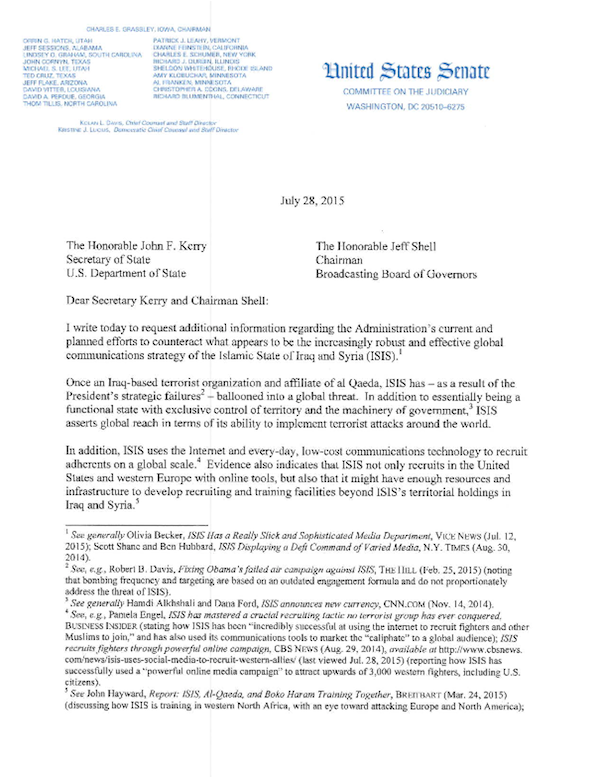
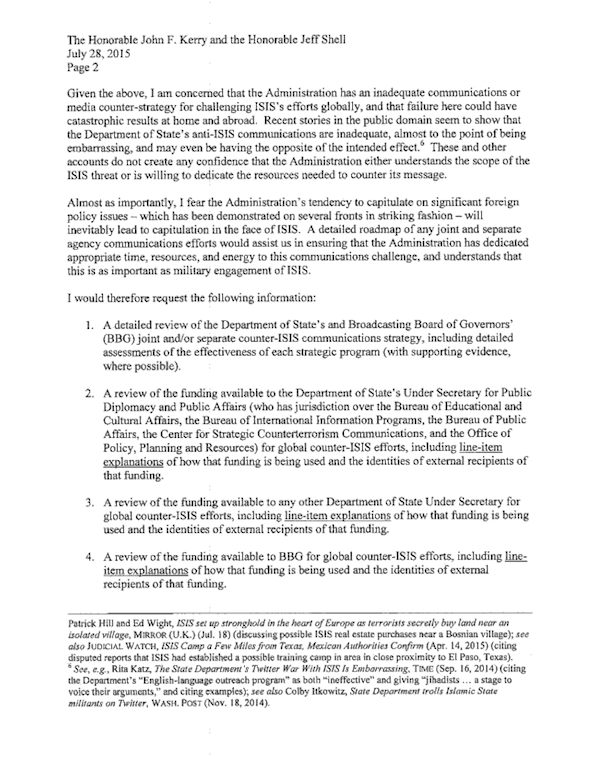

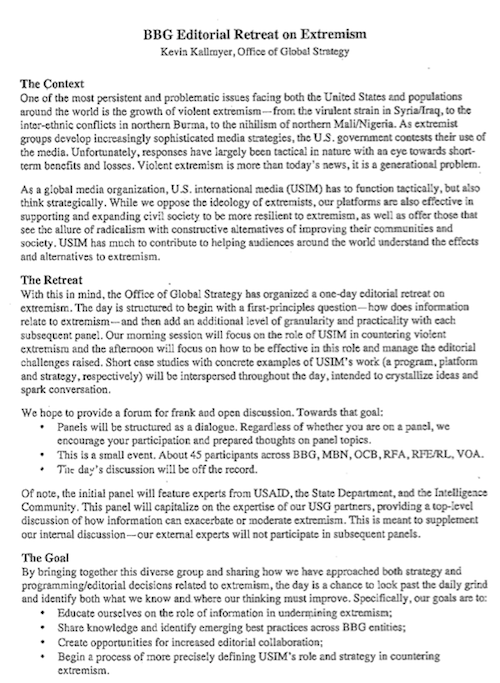
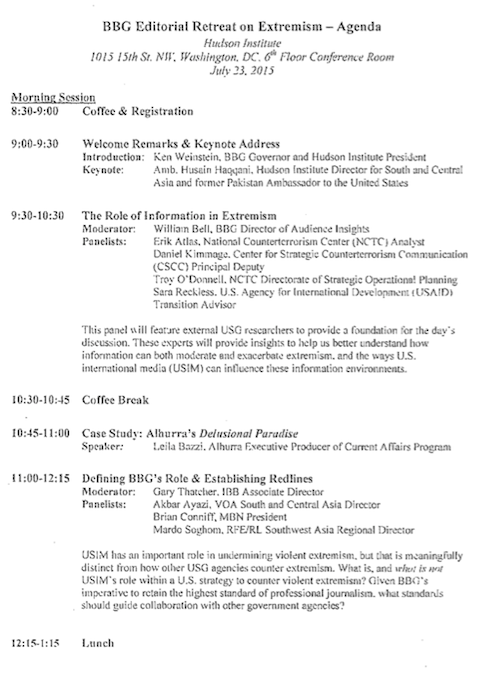

Comments are closed.